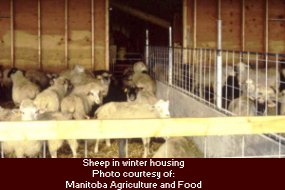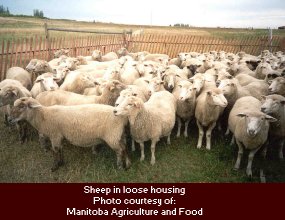Sheep Manure Management
Manure management requirements for sheep are dictated by the type of overall management employed on the farm. In Manitoba, sheep are raised both extensively (on pasture the year round) and more intensively (confined to a yard or shed for at least part of the year).

For the more extensive operations, manure management is not a big issue and in fact is a very sustainable process environmentally, economically and socially. The more intensive or confined operations generally use a straw-based manure management system.

Sheep manure can contain different amounts of nitrogen, phosphorous, potassium, sulfur and micro-nutrients necessary for plant growth. Manure is considered a viable source of organic matter pertinent to improve soil stability, decrease soil density, and increase water retention. Not all manure is composed of the same amount of nutrient level. The diversity in manure nutrients and the variety of crops are challenges producers are faced with today. By testing the soil and manure for nutrient content, the proper amount of manure based on the crop nutrient requirements can be determined and employed.
The application of inappropriate levels of manure can cause pollution if it reaches surface water such as streams, rivers and lakes, or leaches past the root zone of crops and into shallow ground water. Therefore, providing proper manure and compost manure management techniques can be beneficial to the environment, as well as increase on-farm profitability.
Manure management guidelines for Manitoba suggest appropriate storage and application systems for livestock manure including those from sheep enterprises.

